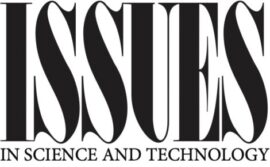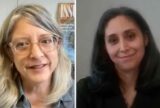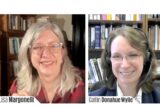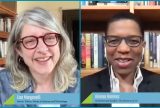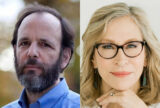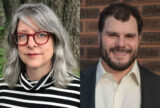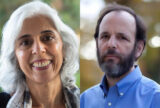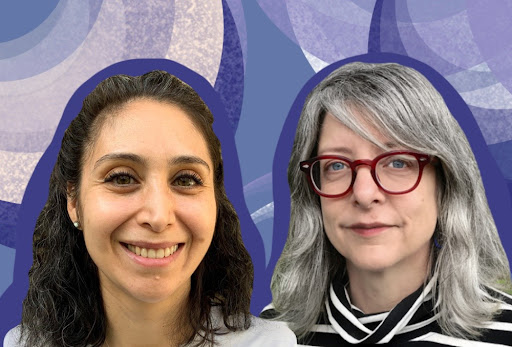
Illustration by Hännah Foote. From left to right: Isabel Cardenas-Navia and Lisa Margonelli.
We are failing Americans without college degrees. Research shows that up to 30 million workers without four-year degrees are drastically underpaid, and have the skills to earn 70 percent more than what they’re currently making. What accounts for this failure of the labor market? One problem is that traditional resumes don’t show or verify the full range of a worker’s skills—including those gained in the military and volunteer work, not to mention family businesses and caretaking. But there’s a promising digital fix that could help: learning and employment records. LERs are digital profiles that allow individuals to document their knowledge and skills, no matter how they were acquired—and have the potential to transform hiring while fueling innovation. What is an LER, and how can it be used to record everything you’ve ever learned? How can this technology be designed and implemented to create more jobs with good wages? And what will it take to design and implement LERs that make the labor market fairer to all workers instead of reinforcing existing social, educational, and digital divides?
Workcred senior director of research Isabel Cardenas-Navia, co-author of a new essay on LERs, and Issues in Science and Technology editor-in-chief Lisa Margonelli visit Zócalo to talk about reconstructing credentialing around a system that recognizes—and even encourages—non-traditional learning and diverse career paths.
Zócalo is proud to partner with Issues in Science and Technology, a quarterly journal published by the National Academies of Sciences, Engineering, and Medicine and Arizona State University, to present discussions focused on the intersection of science, technology and public policy.
The Takeaway
Hello Blockchain, Bye-Bye Resumes
Could Digital Learning and Employment Records (LERs) Create a Fairer Hiring Process?
The resume has been around for hundreds of years, and is one of the most vital parts of the hiring process for workers, employers, and educators. But what resumes leave …
Past Events in this Series
Meet the ‘Mediators’ Who Connect Scientists and the Public
Fossil Preparators Are a Panacea to a Closed-Off Field—And Their Work Offers a New Model for Research
How do colossal Tyrannosaurus rex and Triceratops fossils get from the ground to the natural history museum? And could that process—which involves not just paleontologists but a largely uncredited group …
Scientists Don’t Have to Be Heroes
How NASA and ASU Astronomer Lindy Elkins-Tanton Is Dismantling the Personality-Driven Culture of the Research Laboratory
Two decades ago, NASA’s Psyche mission principal investigator and ASU Interplanetary Initiative vice president Lindy Elkins-Tanton was working toward her PhD at MIT. It was a place she loved, but …
How Can Inventors Respond to the Real-World Effects of Their Inventions?
A More Holistic Approach to the Field Can Make Technology Better for Society
What is it like to be an inventor? Are inventors responsible for the societal ramifications of their creations? And how could a more holistic approach to innovation lead future scientists …
‘Equating Abundance With Stability’ Is an Existential Threat to the U.S. Food System
Agricultural Scientist Molly Jahn Explains How Our Food Supply Became a National Security Problem
Agricultural scientist Molly Jahn started her career inventing new varieties of squashes and melons. But that work led her to wonder and worry about the security of our global food …
How Will Robot Trucks Change American Life?
For All the Promise of Automotive Trucking, the Future of Our Freight System Has a Human Problem
Robotic trucks are beginning to roll out, carrying cargo and promises of revolutionizing freight hauling, reducing traffic, and lowering pollution. But previous waves of automation have eliminated millions of jobs …
Can Innovation Really Solve Society’s Problems?
To Reckon With Today’s Greatest Challenges, We Need to Rethink Innovation Itself
Since World War II, the United States has famously funded research to advance all fields of science and innovation, fueling new disease-fighting drugs, increasing economic productivity, and sparking an information …




